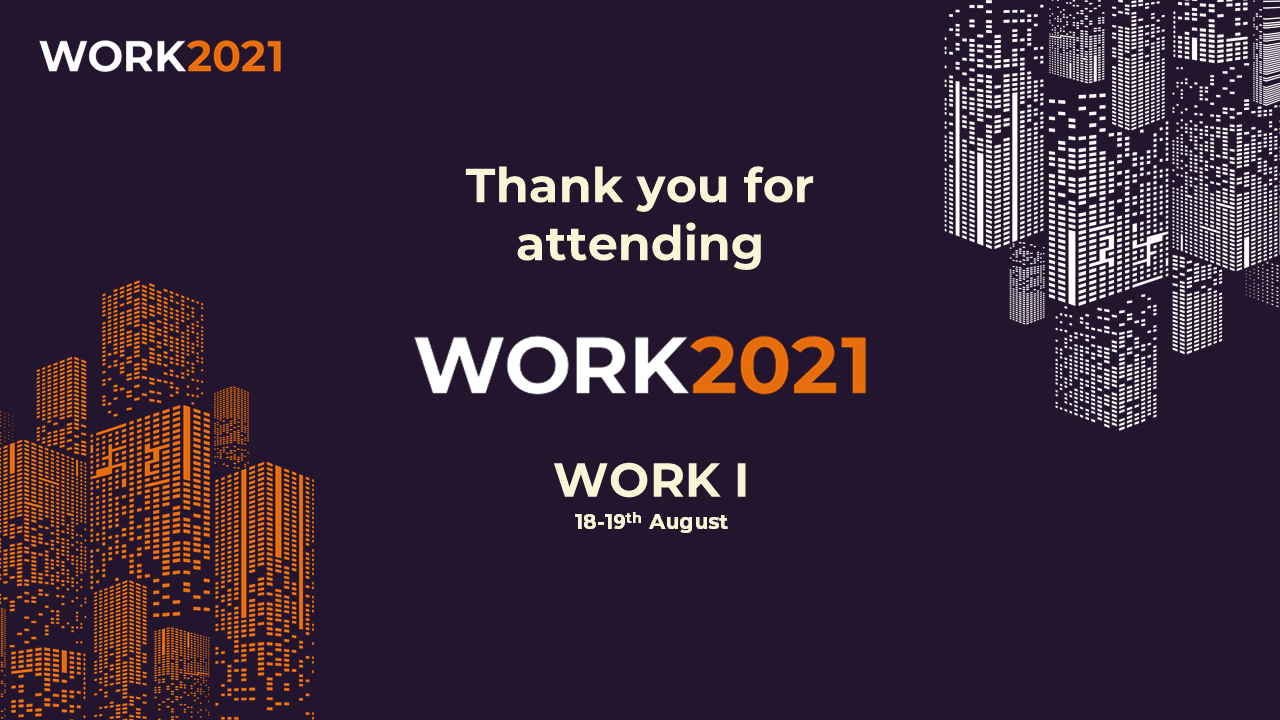Thank you for attending the first WORK 2021 Virtual Meeting, August 18–August 19, 2021. Here are some highlights of the conference, its plenaries and workshops.
HIGHLIGHTS OF WORK I CONFERENCE: WORK BEYOND CRISES
In the first part of WORK2021 conference series, WORK I, discussions revolved around the major challenges the COVID-19 pandemic has brought to people’s lives, working lives and personal living. These discussions revolved closely also to the future work life in the post-pandemic arena: how will it look like.
Altogether 49 presentations were held in the multidisciplinary streams during the conference. The themes of the presentations covered aspects and scenarios concerning the challenges of management and work wellbeing during COVID-19, homeworking and teleworking, workplace practices involving both humans and robots, learning in the context of workplace digitalization and algorithms and health, to name a few. The abstract book is available for all participants and is well worth looking into.
The programme hosted two keynote speeches by Juliet Schor on unpacking the platform economy and by Koen Frenken on safeguarding the public interests in the gig economy.
STANDARD NARRATIVE OF PLATFORM ECONOMY MISSES HETEROGENEITY
Juliet Schor, professor of sociology at Boston College, held the first keynote with the title Contested Terrain: Unpacking the Platform Economy. Professor Steven Vallas from the Northeastern University, chaired the keynote.
Platform economy is extremely controversial, as Schor mentioned in the beginning of her keynote. The idea of platform economy started with the idea of sharing and peer-2-peer type of activities, such as AirBnB, and other forms of renting out private properties. But, for example in China, AirBnB apartments have led to convictions of local families. In many cities around the world the rents have gone up due to market disruptions. These types of publicity have led to the narratives of exploitation. Schor reminded that the discourses on what is going on in the platform economy, and how people see it, are conflicting.
“Platform economy is heterogeneous, dynamic, and contested”, Schor said. “Within different disciplines and literature, there is a lot of variety, how people see platform economy”, she continued.
Schor reminded that the standard narrative of Uberization misses heterogeneity by being too one-dimensional and lacking certain dynamics of power of the platforms. The narrative tends to be too US centric, and Schor mentioned that in the UK Uber drivers are seen as employees. In her keynote Schor described with multiple examples, that the narrative of platform economy lacks heterogeneity within workforce and across markets, places, platforms and time. The story of a platform economy is a dynamic one, but it is not only about being the steamroller or the juggernaut, as platforms are often described. It is more complex kind of dynamics.
Schor explained that workforce heterogeneity means a “retreat from control” as the platform workers can schedule their own work time, the hours they work, and hold a control over the labour process itself, in contrast to McDonalds’ work, for example. Although there has been some debate in the literature about the self-decision of work hours, because workers have to work according to market demand, there is a clear difference between the supplemental workers and dependent workers. Schor presented large research work results according to which the supplemental workers have much more positive experience of the platform work than the dependent workers. Supplemental workers feel that they have more control on their work, and less algorithmic control.
Schor reminded that we need to think about platforms in a more dynamic way. Uberization is only one possible outcome of what happens on platforms,. Schor notes that platforms should be examined more in sights of contestation than the standard narrative gives us, and as more relational, dynamic structures. Schor called for asking a question about the privilege of the domination. How privileged is the narrative of domination? How privileged is the platform when acting as its own goals and pushing out aspects of the mutuality and autonomy? There is no answer yet, and this is a sector that stays very dynamic, Schor said. It is important to understand what we can take from the Uberization narrative, although building a new narrative with more heterogeneous aspects.
Schor reminded, that with regulation, concerning for example minimum wage and idle times, it is possible to lessen or to stop the use of Uber-model on the platforms. Regulation is important and it has grown during the last years. One important aspect is cooperatives. In the US, restaurants have created cooperatives and organized a delivery platform of their own so they don’t have to use the existing platforms.
“Uberization is one important trend of platform economy, but it is not all that is going on”, Schor concluded.
GIG ECONOMY PLATFORMS NEED REGULATION WHEN EXPANDING TO PUBLIC SECTOR
Thursday’s keynote was held by Koen Frenken, Professor of Innovation Studies at the University of Utrecht, with the title Safeguarding Public Interests in the Gig Economy. Senior research fellow, adjunct professor Seppo Poutanen from the University of Turku chaired the keynote.
Frenken argued that gig economy is not an isolated phenomena but a part of larger transformation of the economy, where all kinds of online platforms take center stage and also perform powerful roles in economy and in society. This is also a part of the debate of the future of work. Frenken presented Uber, which is probably the most well-known and most studied and most contested platform, that is used for taxi rides.
The gig economy platforms such as Uber, Helpling and others will diffuse in other sectors in the future, Frenken noted. Platforms are entering fields such as education and health care sector, particularly home care. It is expected that this business model will continue to expand to other sectors, including public sectors. Policy makers, academics and governments are trying to figure out how to regulate this economy. Gig economy platforms blur boundaries of what is an employee and what is a freelancer, what is legal and what is illegal work, what is paid and what is unpaid work, etc. Present institutions are not fit to handle the challenges these platforms are making, so they are difficult to regulate, Frenken reminded.
“Platforms are not anything new in our society”, Frenken reminded. “For example yellow pages, news paper advertisements and labour force offices have all been platforms of their own time. But, what is new, is the technology they use. By using technology, platforms collect data, they match it algorithmically, they exclude participants and they act as a private regulator”, Frenken described.
Gig economy is a relatively small subset of platform economy. Frenken asked whether the gig platforms are really disruptive. Do we have to worry about them and the new regulations concerning them? On the one hand, the answer is yes. Gig economy platforms challenge the very institutions that the social welfare state is based on. Currently, the court cases around the world concerning e.g. the employee role of the gig economy workers, the safe rides of Uber drivers, accidents happening during Deliveroo rides, and so forth tell about the challenges the state has with platform companies. On the other hand, gig economy platforms are not considered disruptive. If you look at the numbers, in the Netherlands out of total number of 9 million workers ca. 0,08 million earn a half of their earning through gig economy platform. According to Frenken, the answer to the question of disruptiveness is maybe. There is a lot of new platforms and business models arising all the time, and if they are unregulated, they may intermediate virtually all flexible labour and spur flexibilization of labour in new sectors.
In the European context, the public interests concerning all platforms include privacy, competition, cybersecurity and discrimination. More specific to gig economy platforms, the public interests are level playing field, tax compliance, consumer protection and labour protection. When pondering the regulational needs for gig economy, it is important to think, where public interest and platform interest converge and diverge, but also, what role platforms play in regulation and enforcement?
Frenken ended his keynote by presenting five different scenarios for platform work. He sees, that the platform workers can be seen as independent contracters or as employees. It is also possible, that some kind of “third category” will emerge, which would be freelance+ model. Fourth scenario is collective bargaining, which means, that gig workers are independent contractors, who are dependent on the platform, and should have the right to collective bargaining . The fifth scenario is minimum tariffs used for freelancer jobs to make sure that people earn a minimum wage.
“The solutions for the regulations of gig economy will not happen quite soon”, Frenken said. “Probably in five to ten years new institutions will emerge to improve the lives of gig workers”, Frenken concluded.




